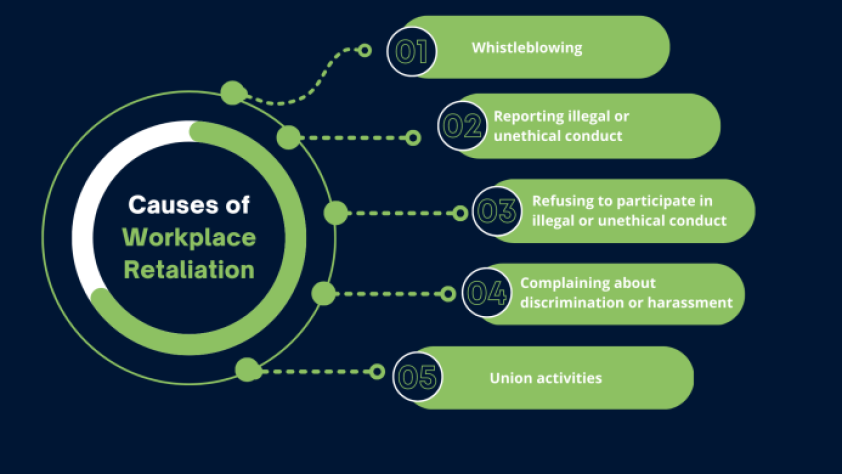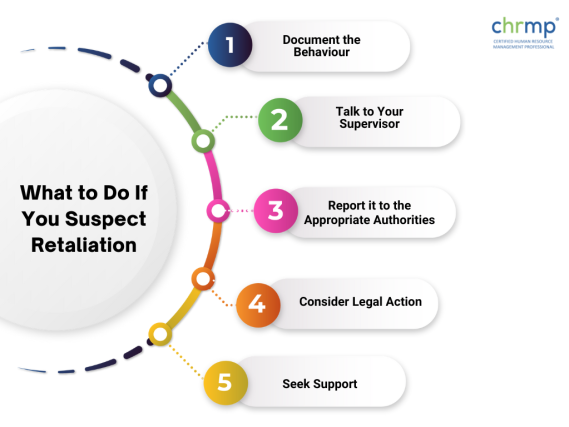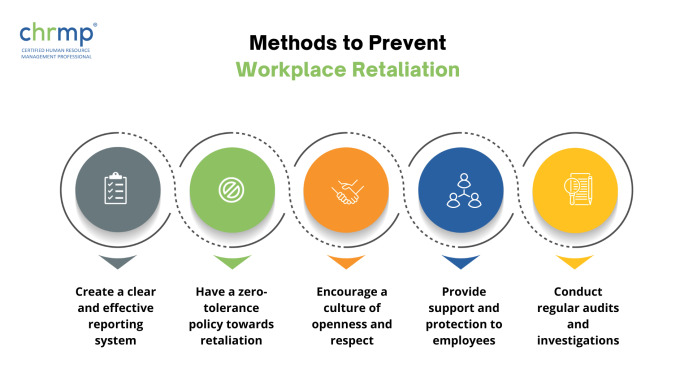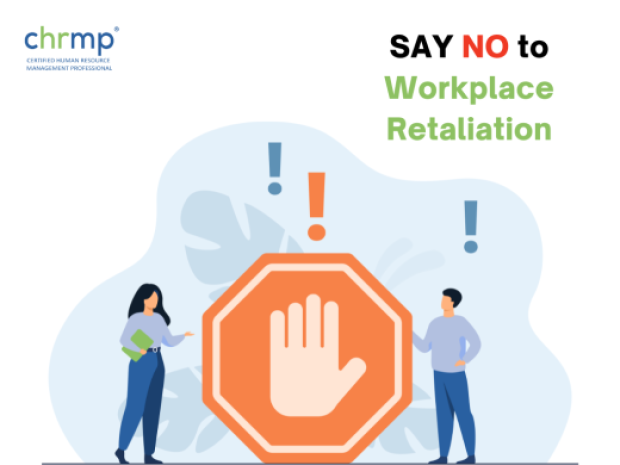

Workplace retaliation is a severe issue affecting employees and employers in today’s fast-paced and competitive business world.
Workplace retaliation can come in many forms, from subtle snubs to blatant sabotage, and it can seriously impact employee morale and productivity.
But here’s the thing, retaliation doesn’t have to be a part of your workplace! Understanding and implementing the right strategies can create a culture of positivity, fairness, and growth.
In this blog, we’ll be sharing the top 5 ways to prevent workplace retaliation.
By the end of this blog, you will have all the tools to create a retaliation-free work environment.
So let’s get started and show retaliation who’s the boss!

Workplace retaliation is any adverse action against an employee resulting from that employee engaging in protected activity.
Protected activity can include reporting misconduct or discrimination, filing a complaint, or participating in an investigation. Examples of retaliation include demotion, termination, harassment, or a change in job assignments or responsibilities.
According to recent studies, over half of all employees who report misconduct or discrimination experience retaliation in some form.
Workplace retaliation can take many forms, including demotion, termination, harassment, or a change in job assignments or responsibilities. It can have a detrimental effect on an employee’s career and well-being and create a hostile work environment for others.
Workplace retaliation is illegal under various federal and state laws, including anti-discrimination laws like Title VII of the Civil Rights Act of 1964 and the Fair Labor Standards Act.
By understanding and implementing the right strategies, you can create a workplace culture that promotes positivity, fairness, and growth, where retaliation is as scarce as an honest politician.
Workplace retaliation can occur for a variety of reasons. It is often a response to an employee reporting illegal or unethical conduct by an employer or coworker or to an employee refusing to participate in such behaviour.

Workplace retaliation can also occur when an employee complains about discrimination, harassment, or unsafe working conditions. In some cases, retaliation may be fuelled by personal hatred or a desire for revenge.
Let’s go through some of the most common causes of workplace retaliation in detail:
Employees who report misconduct or violations of company policies and laws by their employer or coworkers may be subject to workplace retaliation, including discrimination, harassment, or financial fraud.
Similarly, employees who refuse to engage in illegal or unethical conduct may also be subject to retaliation, including being asked to falsify documents or ignoring safety regulations.
Employees who complain about discrimination or harassment based on factors such as race, gender, age, or disability may be subject to retaliation, including demoted, having hours reduced, or termination.
Employees who expose illegal or unethical conduct by their employer may also be subject to retaliation including demotion, having hours reduced, or termination.
Employees who are involved in union activities may be subject to retaliation. This can include things like being demoted, having hours reduced, or termination.
It’s important to note that retaliation is illegal, and employers can face legal consequences for retaliating against employees who have engaged in protected activities.
If you suspect retaliation against you in the workplace, there are several steps you can take to address the situation.
Let’s take a look at some of them:

Keeping a detailed record of the instances of workplace retaliation is crucial when addressing the situation including the incident’s date, time, and details and any evidence such as emails, texts, or witness statements.
Having a clear record of the retaliation will help strengthen your case if you decide to file a complaint or take legal action.
Depending on the nature of the retaliation, it may be appropriate to talk to your immediate supervisor or human resources representative about your concerns.
They may be able to resolve the issue or take steps to protect you from further workplace retaliation. It’s important to approach the conversation calmly and professionally and prepare your documentation of the events.

If the workplace retaliation is illegal, such as discrimination or harassment, report it to the appropriate authorities.
Filing a complaint with these agencies can initiate an investigation into the matter and help protect you from further retaliation.
If the workplace retaliation is severe and you’ve exhausted all other options, you may want to consider taking legal action against your employer.
It’s advisable to consult with an attorney before making this decision, as they can help advise you on your rights and the legal process.
Taking care of your mental and emotional well-being during this time is essential. Reach out to family, friends, collegues, or a therapist for support.

Dealing with workplace retaliation can be emotionally taxing, and it’s essential to have a support system in place to help you cope with the situation.
Remember that it’s not weak to ask for help; it’s powerful!
It’s important to remember that workplace retaliation is against the law, and should not be tolerated. You can help create a safer and more positive work environment for yourself and your colleagues by speaking up and taking the appropriate steps to address it.
Also, don’t forget, if you’re unsure whether something is workplace retaliation, you can always ask yourself, “Is this retaliation or is my coworker just being a jerk?”
Several signs may indicate that your employer is retaliating against you, including:

If you receive unexpectedly negative performance evaluations, or if your evaluations suddenly take a turn for the worse, it could be a sign of retaliation.
This is especially true if the evaluations are inconsistent with your previous performance reviews or are not in line with your peers.
It could also signify that your manager is trying to create a paper trail to justify future disciplinary action or termination.
If you notice a sudden, drastic change in your job responsibilities or duties, and it seems to be in response to your protected activity, it could be retaliation.
This includes being reassigned to a different department, shift, or location with less favourable terms or conditions.
It’s also worth noting that these changes can also be subtle and may not be as obvious.
It could be retaliation if you are demoted or suspended from your job without a clear cause.
This can include a loss of pay, benefits, or status, and the demotion or suspension is often not in line with the company’s usual practices.
This can be a severe form of retaliation, and it’s essential to address it as soon as possible.

If you experience harassment or discrimination at work, such as being ignored, excluded from meetings, or bullied by colleagues or managers, it could be retaliation.
This can also include being subject to a hostile work environment, making it difficult to perform your job. It’s worth noting that this type of retaliation can be subtle and hard to prove.
If you are terminated from your job, it could be retaliation. This is especially true if you were terminated shortly after engaging in protected activity or if your termination is not in line with the company’s usual practices.
This is a severe form of retaliation, and it’s essential to document everything and seek legal counsel if necessary.
It’s important to remember that these actions alone do not necessarily indicate retaliation. Still, suppose you suspect that you are being retaliated against. In that case, it’s essential to document the behaviour, talk to your supervisor or HR, and report it to the appropriate authorities if needed.
Employers must understand and prevent workplace retaliation to protect themselves and their employees.
That’s why we have compiled the top 5 methods to prevent retaliation and create a more positive work environment for everyone involved.
These methods include creating a clear and effective reporting system, having a zero-tolerance policy towards retaliation, encouraging a culture of openness and respect, conducting regular audits and investigations, and providing support and protection to employees.

By implementing these strategies, employers can help create a workplace culture that promotes positivity, fairness, and growth, where retaliation is unacceptable.
Let’s take a look at each of them:
Having a clear and effective reporting system in place can encourage employees to report any concerns or issues without fear of retaliation.
This can include a hotline, email address, or web-based reporting system that allows employees to report concerns anonymously if they choose to. Management should also ensure that the reporting process is easy to understand and accessible to all employees.
Furthermore, management should provide regular training on preventing retaliation and the consequences of engaging in such behaviour.

Employers should make it clear that retaliation will not be tolerated. This can be achieved by developing and enforcing a zero-tolerance policy that clearly defines retaliation and the actions that will be taken against employees who engage in such behaviour.
The policy should be communicated to all employees and reinforced through regular training and education.
Managers should also learn to recognize and respond to retaliation and understand the importance of taking prompt action to address it.
Creating a workplace culture that values openness and respect can help prevent retaliation. Employers should foster an environment where employees feel comfortable speaking up about their concerns, and their voices are heard and valued.
Management should also set a good example by encouraging open communication and treating all employees with respect.
Furthermore, management should actively promote a culture of trust, inclusivity, and mutual respect among all employees.
Regularly conducting audits and investigations can help identify and prevent retaliation.
Employers should conduct regular reviews of employment decisions, such as promotions, demotions, and terminations, to ensure that they are not based on retaliation.
Management should also investigate any complaints or reports of retaliation and take appropriate action to address any issues that are identified.
Furthermore, it’s vital to ensure that independent, unbiased parties conduct the investigations and that findings and outcomes are communicated transparently.

Employers should provide support and protection to employees who report retaliation or engage in protected activities.
This can include providing legal assistance, counselling, and other forms of support to help employees cope with retaliation’s emotional and psychological effects.
Management should also protect employees from further retaliation, such as reassigning them to different roles or providing additional security measures. It’s also essential to keep the employees informed of the investigation outcome and the steps taken to address the retaliation.
It’s important to remember that preventing retaliation requires a continuous effort from management, from creating a safe reporting environment to providing support and protection to employees to holding those who retaliate accountably. The ultimate goal is to create a positive, open and safe work environment for everyone, where retaliation is not an option.
Workplace retaliation is prohibited under various laws and regulations, including:
The Industrial Disputes Act, 1947: This law prohibits employers from taking adverse action against employees who participate in protected activities, such as forming or joining a union or participating in a lawful strike.
The Sexual Harassment of Women at Workplace (Prevention, Prohibition and Redressal) Act, 2013: This law prohibits employers from retaliating against employees who report or file complaints of sexual harassment.
The Whistleblowers Protection Act, 2014: This law protects whistleblowers from retaliation for disclosing information on corruption and other illegal activities.
The Right to Information Act, 2005: This law protects whistleblowers from retaliation for providing information they reasonably believe is evidence of a violation of any law, rule, or regulation.
The Constitution of India: Fundamental rights provided in the constitution of India, such as the right to freedom of speech and expression, and prohibition of discrimination on the grounds of religion, race, caste, sex or place of birth, also provide some level of protection against retaliation.
The laws related to occupational safety and health also protect employees who report safety violations or hazards from retaliation.
It’s important to note that these laws are not exhaustive, and other laws may protect employees from retaliation in certain circumstances. In case of any doubt or violation, employees should seek legal advice.
Q: What are examples of false workplace retaliation claims?
A: False workplace retaliation claims refer to instances where an employee accuses their employer of retaliation when the employer has not actually engaged in retaliatory behaviour. Some examples of false retaliation claims include misunderstandings, standard employment actions, coincidental timing, and personal issues.
Q: Can it be retaliation if I was transferred or reassigned?
A: A transfer or reassignment may be considered retaliation if it is done in response to an employee engaging in protected activity resulting in a change in the terms or conditions of their employment, like a reduction in pay, status or benefits. However, it’s not considered retaliation if it’s a part of a company’s regular business practice or based on the employee’s performance or qualifications.
Q: What if my employer changes my work schedule?
A: A change in work schedule is retaliation if it is done in response to an employee engaging in protected activity, resulting in a difference in the terms or conditions of their employment. However, it’s not considered retaliation if it’s a part of a company’s regular business practice or based on the employee’s performance or qualifications.
Q: What if my salary or benefits are reduced?
A: A reduction in salary or benefits may be considered retaliation if it is done in response to an employee engaging in protected activity and it results in a change in the terms or conditions of their employment. However, it’s not considered retaliation if it’s a part of a company’s regular business practice.
In conclusion, retaliation in the workplace is a serious issue that can have a detrimental effect on employees and the overall morale of a company. Employers must understand and prevent retaliation from protecting themselves and their employees.
By implementing the strategies outlined in this article, employers can help create a workplace culture that promotes positivity, fairness, and growth, where retaliation is not tolerated.
Additionally, it’s essential to be aware of false retaliation claims and address them fairly and thoroughly. Remember, the ultimate goal is to create a safe, open and positive working environment for all employees.
© 2007-2025 CHRMP| All Rights Reserved | Powered by Ripples Learning & Research Private Limited
